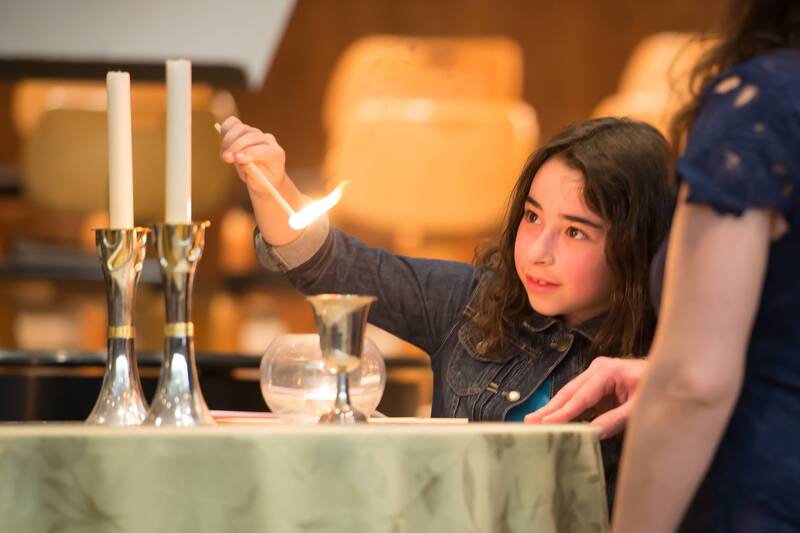Our Cultural Judaism
Being Jewish is to be an heir to Jewish tradition, not a museum curator. To inherit this tradition means that it is ours to choose from, adapt, and use consistent with our own values and beliefs.

As Humanistic Jews, we live, celebrate and teach Cultural Judaism:
- We replace worship in our liturgy with celebrating human knowledge, power and responsibility. We read, say and sing what we truly believe - in both Hebrew texts and English translations.
- We view the Torah and other founding Jewish narratives as powerful myths which are important for Jewish cultural literacy, but not as history or divine revelation.
- We recognize that wisdom comes from many sources, so our Ark contains both the Torah and other Jewish literature from all periods of the Jewish experience.
- We embrace families who identify as Culturally Jewish, Just Jewish, Jew-ish, Jewish and . . . , Half-Jewish, Interfaith, Jews by Choice, Multicultural, Not Religious, Secular, Humanistic, Atheist, and/or Agnostic.
- We view Shabbat as a gift to ourselves: a human invention that makes time meaningful by adding silence to noise, stillness to motion.
- We observe Yom Kippur as an opportunity for self-reflection, repairing relationships, and community connection rather than praying for divine forgiveness and protection. Read more about our approach to other Jewish holidays.
- We adapt Jewish rituals to be consistent with our Humanistic values. For example, we light Shabbat candles while recognizing the light in the world and in each person that gives us warmth and enlightenment. At weddings, we welcome both partners to each break a glass to conclude their wedding, not only the groom (or only one of the grooms!). If we stand when our Ark is opened, we are showing respect for all Jewish wisdom, not only the Torah. If we choose to fast on Yom Kippur, it may be in solidarity with the hungry or to feel part of the Jewish people rather than a means of repentance or atonement.
- Our B Mitzvahs [a gender-inclusive term covering Bar Mitzvah and Bat Mitzvah] are profoundly personal: students may select any Torah portion or other relevant topic for their presentation rather than being assigned the prescribed weekly Torah portion.
FAQs
1. How can a person be Jewish without believing in God?
Being Jewish is not a function of belief; it is a function of identification, connection, community and personal meaning. In fact, in the 2020 Pew Research Center study of American Jews, more than two-thirds of the respondents said being Jewish is mainly a matter of ancestry and culture rather than religion. Are Adam Sandler and Sarah Silverman Jewish? Yes. Do either of them believe in god? The answer to the second question doesn’t affect the first one at all. Learn more about our Humanistic philosophy.
2. Without God, why celebrate Jewish holidays?
Jewish holidays reflect the cycles of nature, the human experience, and Jewish myth and history. We connect with our Jewish heritage through holiday symbols and foods that both evoke memories and are consistent with our Humanistic values and beliefs. We celebrate these holidays with nontheistic inspirational and thought — provoking prose, poetry, and music - both traditional and innovative.
3. If there’s no prayer, what happens at a Kol Hadash service?
We adapt familiar Jewish holidays and traditions to be consistent with our secular philosophy. We have adapted traditional blessings to praise people and the natural world that make bread, wine, and inspiration possible. Instead of praying, we read meaningful poetry and prose that resonate with our Jewish cultural heritage. Sermons or discussions can be on the conventional Torah portion of the week or on history, philosophy, and current events. View some of our past Shabbat and High Holiday services on our YouTube channel, or read about our approach to Jewish holidays.
4. Do you wear head coverings (kippah/yarmulke) and/or prayer shawls (tallis)?
Everyone is welcome to wear whatever makes them feel comfortable or they find personally meaningful. Because the kippah and tallis are conventionally understood to symbolize piety and deference to a god, our rabbi and most of our members choose not to wear them.
5. Does Kol Hadash celebrate Jewish holidays?
Kol Hadash celebrates Shabbat and all major Jewish holidays. We replace prayer with inspirational and thought-provoking prose, poetry, and music. We celebrate the historic, human, and natural foundations for Jewish holidays with rituals and meanings that reflect both Jewish culture and our Humanistic values. Passover becomes a celebration of Jewish survival and self-liberation; our Hanukkah is a connection to the winter solstice and an opportunity to give, not just receive. Learn more about our Holiday celebrations.
6. Is there Hebrew at Kol Hadash’s service?
Hebrew is a foundation of Jewish culture, from our earliest literature to today’s Israeli music. Humanistic Judaism has created alternative Hebrew blessings to be able to celebrate Jewish rituals consistent with our beliefs. Our celebrations include Hebrew (and Yiddish) songs with both translation and transliteration into English to connect to our Jewish roots while being accessible to all. Most service readings are in English to be both inspirational and meaningful. View some past Shabbat and High Holiday services on our YouTube channel, or read about our approach to Jewish holidays.
7. What do you teach your children about Judaism?
Our goal for Jewish education is cultural literacy: understanding the stories, symbols and ceremonies created by and for the Jewish people over the centuries. Our Sunday School students explore the entire range of the Jewish experience and are encouraged to think critically and decide for themselves what Being Jewish and Doing Jewish means to them.
